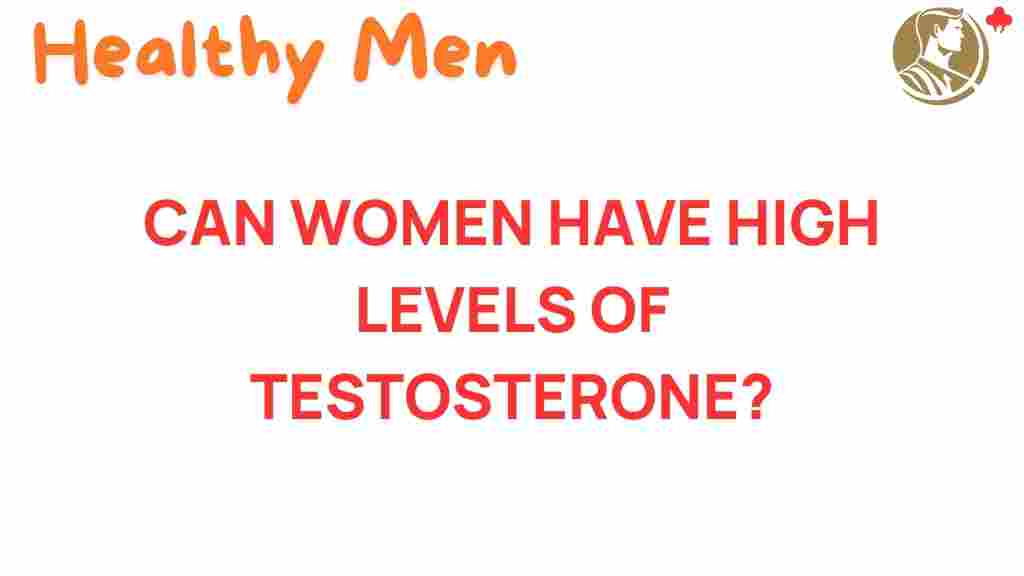Unraveling the Mystery: Can Women Really Have High Levels of Testosterone?
Testosterone is often viewed as a male hormone, but this perspective oversimplifies the complex role that this hormone plays in women’s health. In this article, we will delve into the fascinating world of testosterone in women, exploring its effects on hormone levels, health, fitness, and overall wellness. We will also address common myths surrounding testosterone in women and provide insights into achieving hormonal balance.
Understanding Testosterone in Women
Testosterone is an androgen, a type of hormone that is typically associated with male characteristics. However, women also produce testosterone, albeit in smaller amounts. It is essential for various bodily functions, including:
- Bone density
- Muscle strength
- Libido and sexual function
- Mood regulation
- Energy levels
Normal testosterone levels in women vary but generally range from 15 to 70 ng/dL (nanograms per deciliter). Understanding the balance of hormones in the female body is crucial for overall health and wellness.
How Do Testosterone Levels Affect Women’s Health?
High testosterone levels in women can lead to a variety of health issues, while low levels can also pose problems. Here’s how testosterone impacts women’s health:
- High Testosterone Levels: Excess testosterone can result in symptoms such as increased body hair (hirsutism), acne, irregular menstrual cycles, and even infertility.
- Low Testosterone Levels: Insufficient testosterone may lead to decreased libido, fatigue, depression, and loss of muscle mass.
Women need to maintain a delicate balance of hormones for optimal health. Endocrinology, the study of hormones, plays a pivotal role in understanding these processes.
Common Myths About Testosterone in Women
There are several myths regarding testosterone in women that can lead to misunderstanding and misinformation. Let’s debunk some of the most prevalent myths:
- Myth 1: Testosterone is only important for men.
- Myth 2: High testosterone levels are always harmful to women.
- Myth 3: Women cannot have testosterone therapy.
- Myth 4: Testosterone only affects physical aspects, not mental health.
Understanding these myths is essential for women to make informed decisions about their health and fitness.
The Role of Endocrinology in Hormonal Balance
Endocrinology is the branch of medicine that deals with hormone-related conditions. An endocrinologist can help assess and manage hormone levels in women, including testosterone. They consider various factors, including:
- Age
- Medical history
- Symptoms
- Blood tests to measure hormone levels
Achieving hormonal balance is vital for overall wellness, and a healthcare provider can guide women through this process.
How to Manage Testosterone Levels
Maintaining balanced testosterone levels is crucial for women’s health. Here are some steps to manage hormone levels effectively:
1. Regular Check-Ups
Regular visits to a healthcare provider can help monitor hormone levels. Blood tests can provide insight into testosterone levels and overall hormonal health.
2. Healthy Diet
A balanced diet rich in nutrients can support hormonal health. Consider incorporating:
- Lean proteins (chicken, fish, legumes)
- Fruits and vegetables (especially leafy greens)
- Healthy fats (avocado, nuts, olive oil)
3. Exercise Regularly
Fitness plays a significant role in managing hormone levels. Regular exercise can help:
- Boost testosterone levels naturally
- Improve mood and mental health
- Enhance muscle strength and overall fitness
4. Manage Stress
High stress levels can negatively impact hormone balance. Consider incorporating stress management techniques such as:
- Meditation
- Yoga
- Deep breathing exercises
5. Consider Hormone Therapy
In some cases, women may benefit from testosterone therapy. This should only be considered after thorough consultation with a healthcare provider. Hormone therapy can improve:
- Libido
- Energy levels
- Mood stability
For more information on hormone therapy, check this resource.
Troubleshooting Testosterone Imbalance
If you suspect an imbalance in testosterone levels, consider these troubleshooting tips:
- Monitor Symptoms: Keep track of any symptoms you experience, such as changes in mood, energy levels, or menstrual cycles.
- Consult a Specialist: If you have concerns, consult an endocrinologist or a healthcare provider specializing in hormonal health.
- Stay Informed: Educate yourself about hormone health and the role of testosterone in women’s wellness.
The Future of Testosterone Research in Women
The understanding of testosterone in women is evolving, with ongoing research uncovering new insights. Future studies may focus on:
- The effects of testosterone on women’s mental health
- Long-term effects of hormone therapy
- The relationship between testosterone and chronic diseases
As research progresses, we can expect a more nuanced understanding of how testosterone affects women and how to best manage hormone levels for optimal health.
Conclusion
In conclusion, testosterone is a vital hormone for women, influencing a range of health aspects from mood to muscle strength. Understanding testosterone levels, debunking myths, and recognizing the importance of hormonal balance are crucial for women’s health and wellness. By taking proactive steps, such as regular check-ups, maintaining a healthy lifestyle, and consulting with healthcare professionals, women can effectively manage their testosterone levels and enhance their overall well-being.
For further reading on women’s hormonal health, consider visiting this informative site.
This article is in the category Conditions and created by healthymen Team
